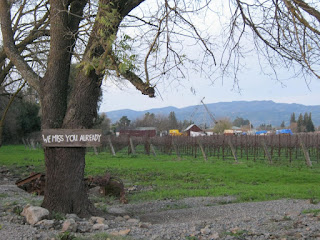 |
| View from Point Reyes National Seashore |
One of the perks of my constant travel is that I can use frequent flyer miles and hotel points for our vacations, so we enjoyed stretching out in the first class cabin on the Delta flight to San Francisco and took in the view of the city from our room at the Hilton San Francisco Union Square.
On our first night in San Francisco, Anna arranged for us to go to Berkeley for dinner at Venus and to see "Arabian Nights" at the Berkeley Rep. What an absolutely enthralling play! With minimal staging -- only about $100,000 worth of Persian rugs and beautiful Arabic costumes -- the Rep created a completely captivating world and drew us in.
 |
| Photo of Berkeley Rep’s 2008 production courtesy of kevinberne.com |
After the service, we strolled across Nob Hill to the Intercontinental Mark Hopkins Hotel for the Christmas Eve buffet dinner at the Top of the Mark. Suffice it to say we left no delicious morsel untasted!
On Christmas Day, we rode the cable cars to Chinatown and Fisherman's Wharf. Naturally, we chose to hang onto the open cable cars on the day when it poured down rain!
One of the seafood restaurants on the wharf, Cioppino's, was actually open on Christmas, so with Anna we enjoyed their namesake dish and a Dungeness crab pizza (most excellent!).
The next day, Anna planned an outing for us to Point Reyes National Seashore. In addition to the breathtaking views of the Pacific Ocean, we also literally lost our breath climbing the 303 steps down to the Point Reyes Lighthouse -- and back up again!
The girls were brave to try Drake's Bay oysters on our way from Point Reyes to Petaluma, and I got to practice my oyster shucking skills.
We also visited Larson Family Vineyards near Petaluma, enjoying a taste of their excellent wines (and bringing home four bottles to enjoy later!).
 |
| "We Miss You Already," says the sign as we leave Larson Family Vineyards. |
After a last look at the Golden Gate Bridge, we headed to the airport. The long flight to Minneapolis and the short hop to Appleton went smoothly, and we're now back at home reflecting on our blessings (and planning our next trip back to San Francisco!).





























